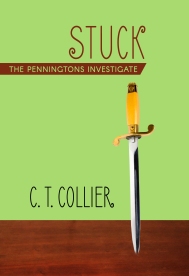Every week is a mystery on Mystery Mondays. You never know what writing topic we’ll cover. This week, I am trilled to have author C.T. Collier here to talk about critique groups.
The Benefits of Critiques with a Variety of Readers and Writers
by C. T. Collier
Nothing improves my writing so much as critique sessions with a variety of writers. That’s one reason I’m an active member of three face-to-face writers groups and one online group, all of whom offer critiques of one kind or another. My local writer’s group is a community of people who love language. My nearby-city group is a mix of published and aspiring writers, fiction and non-fiction. My regional group, which is a mix of readers and writers, is all about mysteries. And my online group is set up for mystery authors focused on publication. Each group in its own way is helpful to my writing, and I believe my contributions are helpful to theirs as well.
How do those language lovers around the table at my local library benefit me as a published author? Every time we meet, I’m reminded of what drew me to writing in the first place. It wasn’t the desire to have my words in print. It was the desire to use language effectively to bring to life my thoughts, hopes, dreams, and stories. All of us in the local writers group share that. Whether I’m reading a five-minute clip of my work-in-progress or listening to others, the experience rekindles my respect for and passion for the written word.
My close-by-city writers group schedules three critique meetings each year into its regular monthly schedule. The procedure is simple: each submission goes out to participants a few days ahead of the meeting; each participant prepares written comments for each submission. On critique day, we go round robin, one submission at a time, sharing our (always constructive) feedback and offering encouragement. With such a variety of input, my work-in-progress improves in ways I could not accomplish on my own. And I learn from and help all the participants, always a good feeling.
My mystery-only group is still in the formation stage and has not yet integrated critiques with meetings. However, three other members are writers with whom I critique one-on-one. Check back in a year to see how this evolves. There are many models to consider and an exciting variety of members interested in participating.
My online publication-focused group offers a variety of critique modes—subgroups that focus by subgenre; full-manuscript swaps; feedback for partial work in progress; and other types. I participate in several, and I always learn from the critical feedback. Just as important, I learn by reading another author’s work and offering feedback. I spot better ways of phrasing. I see tight plotting and weak plotting and get a sense of how my own can improve. I see another writer’s “darlings” and, from the experience, get the courage to eliminate my own.
Just as important—and this is true for all the critique sessions, regardless of the type of group—is ongoing community with writers. Writing can be a lonely business. And, since my intention in writing novels is threefold—to communicate, to inform, and to entertain—getting candid reader feedback and constructive editorial feedback are essential in making my book the best it can be before sending it to my editor. Finally, some critiquers become invested in my work, and I in theirs, and we become eager readers and good ambassadors for each other.
The benefits of critiques are many, and the only costs are the courage to put my work out there and the time to prepare thoughtful helpful responses to my fellow writers. If you haven’t ventured into critiques, I strongly encourage it. Please share your comments and questions about critiques with us below.
Who is C.T. Collier?
 C. T. Collier was born to solve logic puzzles, wear tweed, and drink Earl Grey tea. Her professional experience in cutthroat high tech and backstabbing higher education gave her endless opportunity to study intrigue. Add to that her longtime love of mysteries, and it’s no wonder she writes academic mysteries that draw inspiration from traditional whodunits. Her setting is entirely fictional: Tompkins College is no college and every college, and Tompkins Falls is a blend of several Finger Lakes towns, including her hometown, Seneca Falls, NY
C. T. Collier was born to solve logic puzzles, wear tweed, and drink Earl Grey tea. Her professional experience in cutthroat high tech and backstabbing higher education gave her endless opportunity to study intrigue. Add to that her longtime love of mysteries, and it’s no wonder she writes academic mysteries that draw inspiration from traditional whodunits. Her setting is entirely fictional: Tompkins College is no college and every college, and Tompkins Falls is a blend of several Finger Lakes towns, including her hometown, Seneca Falls, NY
STUCK by C.T. Collier
 Meet the Penningtons—Lyssa, Ph.D. Economics, and her husband “the handsome Brit” Kyle, Ph.D. Computer Science—in their second investigation, Stuck.
Meet the Penningtons—Lyssa, Ph.D. Economics, and her husband “the handsome Brit” Kyle, Ph.D. Computer Science—in their second investigation, Stuck.
Murder never entered the picture until Fritz Van Derzee decided, at long last, to clear his name. Who stuck a jeweled stiletto into his desktop after stabbing him to death? Fritz’s daughter, Emma, recruits her former professor Lyssa Pennington to find the killer.
And where’s the ten million Fritz was falsely accused of embezzling? Tompkins College President, Justin Cushman, hires his old friend Kyle Pennington to trace the missing money.
While Lyssa uses charm and tenacity on the long list of suspects, Kyle reconstructs the college’s old homegrown finance system. As they converge on the killer, Lyssa and Kyle may be the next two casualties.


A good critique group can be invaluable. I miss the one I was a member of for years. Alas, most of the participants–including yours truly–moved to other locales. Haven’t been able to find another since (now thirteen years). 😦
–Michael
LikeLiked by 2 people
Michael, it’s so important to find a group you can work with, and it’s hard, I know!! Right now I have a small online critique group that is getting off the ground with some productive back and forth. It’s not the same as meeting face-to-face, but the feedback is really valuable! Good luck.
LikeLiked by 1 person
Hi Michael, I live in a small town, so I don’t have a critique group either. I do have wonderful beta readers that I couldn’t write without!
LikeLiked by 2 people
Kristina, I guess I’m just a “lone wolf” for now. How did you find trusted beta readers (and how many)?
LikeLiked by 2 people
I have 4 or 5 beta readers per novel. I found them by trying different people and ended up with a group that is enthusiastic and not afraid to give honest feedback. It took me a year to find the right people, so it’s not easy. I still branch out to a new beta reader once in a while, but I’m very careful when I do. Beta reading takes a lot of work, and I want to make sure the person understands what they are committing to.
LikeLiked by 1 person
Thanks, Kristina, for hosting me today! I love the opportunity to mingle with your readers and to share about a subject so important to me– critiques.
LikeLiked by 2 people
Hi Kate, It’s great to have you here! Thanks for contributing to Mystery Mondays.
LikeLike
Well put C.T. I couldn’t agree more. Critique groups are a vital component of eventually becoming a published writer. I belonged to two in Canada and now that I spent most of my time in Spain, I still Skype once a month with one group. I have found two groups here in Spain as well. All different, all valuable. A great article!
LikeLiked by 2 people
Hi Darlene, I’m sure it’s fun getting involved with people from different cultures is an asset. Must keep things interesting.
LikeLiked by 1 person
Very interesting. It makes me realize the things we write without thinking come across very different to another culture, even if that culture is English speaking!
LikeLiked by 2 people
Darlene, thanks so much for sharing your experience with Skype for critiquing. I always appreciate the visual/video contact Skype makes possible when collaborating at a distance, and the realtime meeting is a big win. –kate/c.t. collier
LikeLiked by 1 person
Skyping has worked very well. I would not have written 2 books while being overseas if it had not been for Skyping! Just dealing with the time difference can be tricky at times but we worked it out.
LikeLiked by 2 people
When I lived inEngland, I benefited from feedback from the local writers’ group I was in. Unfortunately, I moved away and then ended up in a wheelchair. Since then I have used online beta readers and that has been helpful. I miss the personal contact, although there is a local writers’ group here in Boise – but I cannot get to their meetings as my wheelchair restricts my getting out.
LikeLiked by 2 people
Roland, I wonder if Darlene’s experience with Skype might give you another possibility for enhancing your online experience with some realtime, face-to-face exchanges.
LikeLiked by 1 person
A good suggestion, although I’d need to get set up with a camera and mike – and someone that can handle my slurred thinking. No fun being disabled. 🙂
LikeLiked by 2 people
And yet, you still managed to write a great book. Your thinking can’t be to slurred. I use the camera on my mac and I don’t use a mike for Skype calls. They usually work ok. Google hangouts is good too if you have a gmail account.
LikeLiked by 2 people
I believe critiques are an absolute necessity for writers. Pro athletes (golfers, baseball, soccer, whatever) all go to other pros for feedback on their skills.Since we write for readers and writers are some of the best readers ever…just ask anyone with a to-be-read pile that occupies one whole corner of a room…their eyes can spot things the author reads past. Just make sure your group has people who like to read the genre in which you write. Finding compatible partners takes work and can be a tough go. Nice post. .
LikeLiked by 2 people
Hi CJ. On the the requests I find most valuable is asking my early readers to tell me when they skim. Then I know I’ve included too much backstory. It’s true the extra eyes find things I can’t see.
LikeLike
Nicely put! I find my critique group to be invaluable. Mine is on-line and a few of the members have even met in person although we live in different parts of the country. One of our members ended up with a three-book deal with a major publishing house…and I like to think it’s in part because our critiques. 🙂
LikeLiked by 2 people
Hi K.L, Congrats on being part of a three book deal. I’ll bet the authors feels lucky to have such a great critique group. I’m surprised how many people are in online critique groups. I might have to find one.
LikeLiked by 1 person
Reblogged this on Don Massenzio's Blog and commented:
Check out featured Mystery Mondays author, C.T. Collier, from Kristina Stanley’s blog
LikeLiked by 2 people